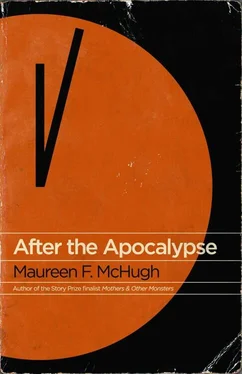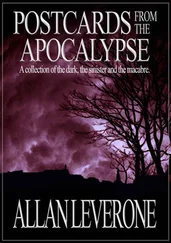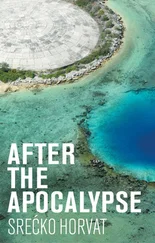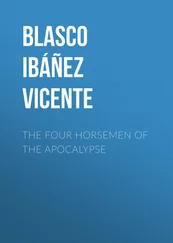Then the fires started on the east side of town. The power went out and stayed out. Pete didn’t come home until the next day, and he slept a couple of hours and then when back out to work. The air tasted of smoke—not the pleasant, clean smell of wood smoke, but a garbagey smoke. Franny complained that it made her sick to her stomach.
After Pete didn’t come home for four days, it was pretty clear to Jane that he wasn’t coming back. Jane put Franny in the car, packed everything she could think of that might be useful. They got about 120 miles away, far enough that the burning city was no longer visible, although the sunset was a vivid and blistering red. Then they ran out of gas, and there was no more to be had.
There were rumors that there was a refugee camp for homeless outside of Toronto. So they were walking to Detroit.
Franny says, “You can’t leave me! You can’t leave me!”
“Do you want to go scavenge with me?” Jane says.
Franny sobs so hard she seems to be hyperventilating. She grabs her mother’s arms, unable to do anything but hold onto her. Jane peels her off, but Franny keeps grabbing, clutching, sobbing. It’s making Jane crazy. Franny’s fear is contagious, and if she lets it get in her, she’ll be too afraid to do anything. She can feel it deep inside her, that thing that has always threatened her, to give in, to stop doing and pushing and scheming, to become like her useless, useless father puttering around the house vacantly, bottles hidden in the garage, the basement, everywhere.
“GET OFF ME!” she screams at Franny, but Franny is sobbing and clutching.
She slaps Franny. Franny throws up, precious little, water and crackers from breakfast. Then she sits down in the grass, just useless.
Jane marches off into the first house.
She’s lucky. The garage is closed up and there are three cans of soup on a shelf. One of them is cream of mushroom, but luckily, Franny liked cream of mushroom when she found it before. There are also cans of tomato paste, which she ignores, and some dried pasta, but mice have gotten into it.
When she gets outside, some strange guy is standing on the sidewalk, talking to Franny, who’s still sitting on the grass.
For a moment she doesn’t know what to do, clutching the cans of soup against her chest. Some part of her wants to back into the house, go through the dark living room with its mauve carpeting, its shabby blue sofa, photos of school kids and a cross-stitch flower bouquet framed on the wall, back through the little dining room with its border of country geese, unchanged since the eighties. Out the back door and over the fence, an easy moment to abandon the biggest mistake of her life. She’d aborted the first pregnancy, brought home from Pasadena in shame. She’d dug her heels in on the second, it’s-my-body-fuck-you.
Franny laughs. A little nervous and hiccupy from crying, but not really afraid.
“Hey,” Jane yells. “Get away from my daughter!”
She strides across the yard, all motherhood and righteous fury. A skinny, dark-haired guy holds up his hands, palms out, no harm, ma’am.
“It’s okay, mom,” Franny says.
The guy is smiling. “We’re just talking,” he says. He’s wearing a red plaid flannel shirt and T-shirt and shorts. He’s scraggly, but who isn’t.
“Who the hell are you,” she says.
“My name’s Nate. I’m just heading north. Was looking for a place to camp.”
“He was just hanging with me until you got back,” Franny says.
Nate takes them to his camp—also behind a house. He gets a little fire going, enough to heat the soup. He talks about Alabama, which is where he’s coming from, although he doesn’t have a Southern accent. He makes some excuse about being an army brat. Jane tries to size him up. He tells some story about when two guys stumbled on his camp north of Huntsville, when he was first on the road. About how it scared the shit out of him but about how he’d bluffed them about a buddy of his who was hunting for their dinner but would have heard the racket they made and could be drawing a bead on them right now from the trees, and about how something moved in the trees, some animal, rustling in the leaf litter, and they got spooked. He’s looking at her, trying to impress her, but being polite, which is good with Franny listening. Franny is taken with him, hanging on his every word, flirting a little the way she does. In a year or two, Franny was going to be guy crazy, Jane knew.
“They didn’t know anything about the woods, just two guys up from Biloxi or something, kind of guys who, you know, manage a copy store or a fast-food joint or something, thinking that now that civilization is falling apart they can be like the hero in one of their video games.” He laughs. “I didn’t know what was in the woods, neither. I admit I was kind of scared it was someone who was going to shoot all of us, although it was probably just a sparrow or a squirrel or something. I’m saying stuff over my shoulder to my ‘buddy,’ like, ‘Don’t shoot them or nothing. Just let them go back the way they came.’”
She’s sure he’s bullshitting. But she likes that he makes it funny instead of pretending he’s some sort of Rambo. He doesn’t offer any of his own food, she notices. But he does offer to go with them to get their stuff. Fair trade, she thinks.
He’s not bad looking in a kind of skinny way. She likes them skinny. She’s tired of doing it all herself.
The streetlights come on, at least some of them. Nate goes with them when they go back to get their sleeping bags and stuff. He’s got a board with a bunch of nails sticking out of one end. He calls it his mace.
They are quiet, but they don’t try to hide. It’s hard to find the stuff in the dark, but luckily, Jane hadn’t really unpacked. She and Franny, who is breathing hard, get their sleeping bags and packs. It’s hard to see. The backyard is a dark tangle of shadows. She assumes it’s as hard to see them from inside the house—maybe harder.
Nothing happens. She hears nothing from the house, sees nothing, although it seems as if they are all unreasonably loud gathering things up. They leave through the side gate, coming nervously to the front of the house, Nate carrying his mace and ready to strike, she and Franny with their arms full of sleeping bags. They go down the cracked driveway and out into the middle of the street, a few gutted cars still parked on either side. Then they are around the corner and it feels safe. They are all grinning and happy and soon putting the sleeping bags in Nate’s little backyard camp made domestic—no, civilized—by the charred ash of the little fire.
In the morning, she leaves Nate’s bedroll and gets back to sleep next to Franny before Franny wakes up.
They are walking on the freeway the next day, the three of them. They are together now, although they haven’t discussed it, and Jane is relieved. People are just that much less likely to mess with a man. Overhead, three jets pass going south, visible only by their contrails. At least there are jets. American jets, she hopes.
They stop for a moment while Nate goes around a bridge abutment to pee.
“Mom,” Franny says. “Do you think that someone has wrecked Pete’s place?”
“I don’t know,” Jane says.
“What do you think happened to Pete?”
Jane is caught off guard. They left without ever explicitly discussing Pete, and Jane just thought that Franny, like her, assumed Pete was dead.
“I mean,” Franny continues, “if they didn’t have gas, maybe he got stuck somewhere. Or he might have gotten hurt and ended up in the hospital. Even if the hospital wasn’t taking regular people, like, they’d take cops. Because they think of cops as one of their own.” Franny is in her adult-to-adult mode, explaining the world to her mother. “They stick together. Cops and firemen and nurses.”
Читать дальше












